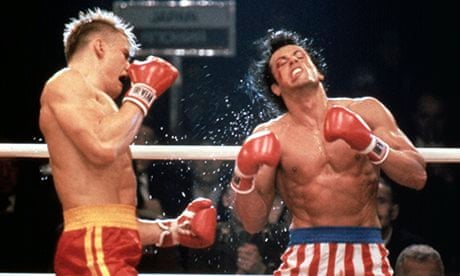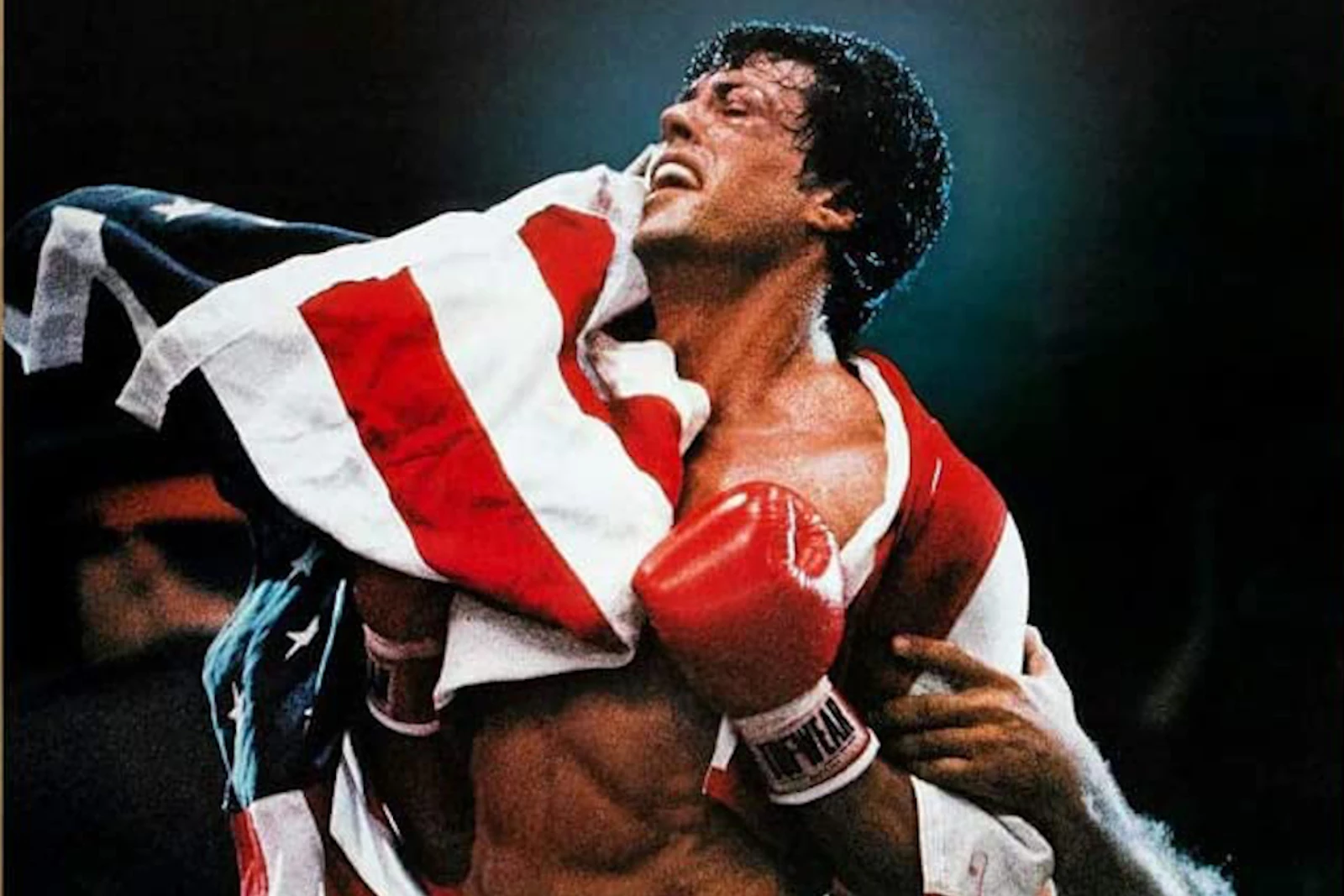The Resilience of the Human Spirit: A Cinematic Journey Through the Rocky Franchise
Introduction:
Since its inception in 1976, the "Rocky" film series has captivated audiences worldwide with its compelling narrative of perseverance, determination, and the triumph of the human spirit. Created by Sylvester Stallone, who also portrayed the iconic protagonist Rocky Balboa, the franchise has evolved into a cultural phenomenon, spanning eight films and garnering critical acclaim and commercial success. This review explores the enduring legacy of the "Rocky" franchise, tracing its evolution across decades and dissecting the thematic depth and cinematic craftsmanship that have made it a timeless classic.
Rocky (1976): A Tale of Underdog Triumph
The inaugural installment of the franchise, "Rocky," remains a cinematic masterpiece that transcends its sports-drama genre. Set against the gritty backdrop of Philadelphia, the film introduces audiences to Rocky Balboa, a down-and-out boxer given a once-in-a-lifetime opportunity to challenge the heavyweight champion, Apollo Creed. At its core, "Rocky" is a story of resilience and self-discovery, as Rocky navigates the highs and lows of his tumultuous journey towards redemption.
Central to the film's success is Stallone's tour de force performance as Rocky Balboa, a role that would define his career and cement his status as a Hollywood icon. Stallone's portrayal captures the essence of Rocky's character—a blue-collar everyman with dreams of greatness—and imbues him with vulnerability, grit, and unwavering determination. Through Stallone's nuanced performance, audiences are drawn into Rocky's world, rooting for him every step of the way as he defies the odds and faces his fears in the boxing ring.:max_bytes(150000):strip_icc()/rocky-iv_610_0-98a9585d6c3049ee8a11083a559ecdbf.jpg) Director John G. Avildsen's masterful direction further elevates the film, infusing it with authenticity, poignancy, and raw emotional power. Avildsen's use of gritty cinematography, intimate character moments, and stirring musical score creates a visceral and immersive viewing experience, immersing audiences in Rocky's world and eliciting a profound emotional response. From the iconic training montage set to Bill Conti's "Gonna Fly Now" to the climactic showdown in the ring, "Rocky" resonates on both an emotional and visceral level, leaving an indelible impact on viewers long after the credits roll.
Director John G. Avildsen's masterful direction further elevates the film, infusing it with authenticity, poignancy, and raw emotional power. Avildsen's use of gritty cinematography, intimate character moments, and stirring musical score creates a visceral and immersive viewing experience, immersing audiences in Rocky's world and eliciting a profound emotional response. From the iconic training montage set to Bill Conti's "Gonna Fly Now" to the climactic showdown in the ring, "Rocky" resonates on both an emotional and visceral level, leaving an indelible impact on viewers long after the credits roll.
Rocky II (1979) and Beyond: The Journey Continues
Following the unprecedented success of "Rocky," Stallone returned to reprise his role as the titular character in "Rocky II," delving deeper into Rocky's personal and professional struggles in the aftermath of his bout with Apollo Creed. While "Rocky II" may lack the raw intensity and narrative novelty of its predecessor, it nevertheless succeeds in expanding upon Rocky's character arc and exploring themes of perseverance, love, and redemption.
Subsequent installments in the franchise, including "Rocky III" (1982), "Rocky IV" (1985), and "Rocky V" (1990), further chart Rocky's evolution as a character, tracing his journey from a scrappy underdog to a seasoned veteran contending with personal and professional challenges. Each film in the series offers its own unique blend of heart-pounding action, emotional resonance, and thematic depth, culminating in Rocky's ultimate quest for self-actualization and fulfillment. However, it is "Rocky Balboa" (2006) that stands out as a poignant and introspective exploration of Rocky's character, marking Stallone's triumphant return to form both as an actor and a filmmaker. Set against the backdrop of Rocky's twilight years, the film finds the aging boxer grappling with loss, regret, and the passage of time as he embarks on one final, against-all-odds comeback. Stallone's nuanced performance and deft direction infuse "Rocky Balboa" with a sense of gravitas and authenticity, offering a poignant meditation on mortality, legacy, and the enduring power of the human spirit.
However, it is "Rocky Balboa" (2006) that stands out as a poignant and introspective exploration of Rocky's character, marking Stallone's triumphant return to form both as an actor and a filmmaker. Set against the backdrop of Rocky's twilight years, the film finds the aging boxer grappling with loss, regret, and the passage of time as he embarks on one final, against-all-odds comeback. Stallone's nuanced performance and deft direction infuse "Rocky Balboa" with a sense of gravitas and authenticity, offering a poignant meditation on mortality, legacy, and the enduring power of the human spirit.
A Legacy of Inspiration and Empowerment
In conclusion, the "Rocky" franchise stands as a testament to the enduring power of storytelling to inspire, empower, and uplift audiences across generations. Through its compelling characters, gripping narratives, and universal themes of resilience, determination, and redemption, the franchise has left an indelible mark on popular culture and continues to resonate with viewers worldwide. From its humble beginnings as a low-budget underdog story to its status as a beloved cultural phenomenon, the "Rocky" franchise embodies the quintessential American dream—a testament to the resilience of the human spirit in the face of adversity. As audiences continue to revisit Rocky's iconic journey time and again, the franchise's enduring legacy serves as a reminder of the transformative power of cinema to touch hearts, ignite imaginations,
From its humble beginnings as a low-budget underdog story to its status as a beloved cultural phenomenon, the "Rocky" franchise embodies the quintessential American dream—a testament to the resilience of the human spirit in the face of adversity. As audiences continue to revisit Rocky's iconic journey time and again, the franchise's enduring legacy serves as a reminder of the transformative power of cinema to touch hearts, ignite imaginations,
In the annals of cinema, few franchises resonate as deeply with audiences as the Rocky series. Spanning over four decades, this iconic saga chronicles the life and career of Rocky Balboa, a humble Italian-American boxer from Philadelphia, as he navigates the highs and lows of the boxing world and confronts the challenges of life outside the ring. From its humble beginnings in 1976 to its latest installment, the Rocky franchise has captivated audiences with its stirring narratives, memorable characters, and timeless themes of perseverance, resilience, and redemption. This review explores the enduring legacy of the Rocky series, tracing its evolution across eight films and examining its cultural significance and enduring appeal.
The journey begins with "Rocky," directed by John G. Avildsen and written by its star, Sylvester Stallone. Set against the gritty backdrop of Philadelphia, the film introduces audiences to Rocky Balboa, a down-on-his-luck boxer eking out a living as a debt collector for a loan shark. When Rocky is offered a shot at the heavyweight title against the arrogant champion Apollo Creed (Carl Weathers), he seizes the opportunity to prove himself to the world and fulfill his dream of greatness.
What sets "Rocky" apart is its raw authenticity and heartfelt storytelling. Stallone's nuanced performance as the lovable underdog, coupled with Avildsen's deft direction and Bill Conti's iconic musical score, imbues the film with a palpable sense of emotion and pathos. The climactic bout between Rocky and Creed remains one of cinema's most iconic moments, a stirring testament to the power of determination and resilience in the face of insurmountable odds.
Rocky II (1979): The success of "Rocky" paved the way for its sequel, "Rocky II," which picks up immediately after the events of the first film. Now a bona fide celebrity, Rocky struggles to adapt to life outside the ring while grappling with financial woes and personal demons. When Creed challenges him to a rematch, Rocky must summon the courage and determination to prove himself once again, both as a boxer and as a man.
The success of "Rocky" paved the way for its sequel, "Rocky II," which picks up immediately after the events of the first film. Now a bona fide celebrity, Rocky struggles to adapt to life outside the ring while grappling with financial woes and personal demons. When Creed challenges him to a rematch, Rocky must summon the courage and determination to prove himself once again, both as a boxer and as a man.
"Rocky II" builds upon its predecessor's themes of perseverance and redemption, delving deeper into Rocky's inner turmoil and his quest for self-identity. Stallone's portrayal of Rocky's internal struggles is riveting, capturing the character's vulnerability and resilience with remarkable depth and authenticity. The film's emotional climax, culminating in Rocky's triumphant victory over Creed, is a testament to the enduring power of hope and perseverance in the face of adversity.
Rocky III (1982):
With "Rocky III," the franchise takes a more introspective turn, exploring the perils of fame and the sacrifices required to maintain success. Directed by Stallone himself, the film sees Rocky basking in the glory of his championship reign until he is dethroned by the ruthless Clubber Lang (Mr. T). Stripped of his title and consumed by self-doubt, Rocky seeks guidance from his former nemesis-turned-mentor, Apollo Creed, as he embarks on a journey of self-discovery and redemption. "Rocky III" is notable for its electrifying fight sequences, dynamic performances, and memorable soundtrack, including the iconic anthem "Eye of the Tiger." Stallone delivers a tour de force performance as Rocky, navigating the character's evolution from brash upstart to seasoned veteran with aplomb. The film's themes of resilience, friendship, and redemption resonate deeply, culminating in a climactic showdown between Rocky and Clubber Lang that ranks among the series' most memorable moments.
"Rocky III" is notable for its electrifying fight sequences, dynamic performances, and memorable soundtrack, including the iconic anthem "Eye of the Tiger." Stallone delivers a tour de force performance as Rocky, navigating the character's evolution from brash upstart to seasoned veteran with aplomb. The film's themes of resilience, friendship, and redemption resonate deeply, culminating in a climactic showdown between Rocky and Clubber Lang that ranks among the series' most memorable moments.










































